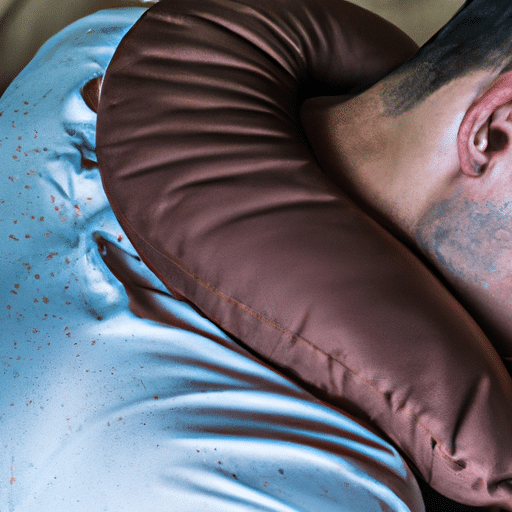Have you ever wondered if your sleeping habits could be affecting your overall health? We have some surprising news for you. In this article, we will explore the reasons why sleeping on super thick pillows might not be the best choice for your wellbeing. From potential neck and back pain to compromised spinal alignment, we delve into the potential risks associated with using excessively thick pillows and provide you with valuable insights to help you make the best choice for your sleep comfort and health. So, if you’re ready to upgrade your pillow game, keep reading!
Review contents
Potential health issues
Neck and shoulder pain
Sleeping on super thick pillows can lead to neck and shoulder pain. The excess height of these pillows can cause our neck to be unnaturally angled, leading to strain and discomfort. When our neck is not properly aligned with our spine, it puts pressure on the muscles and ligaments, resulting in pain and stiffness. Over time, this can lead to chronic issues that impact our daily lives.
Headaches and migraines
Another potential health issue that can arise from sleeping on super thick pillows is headaches and migraines. When our neck is not properly supported, it can put a strain on the muscles and nerves in our neck and head. This added pressure can contribute to headaches and migraines, making it difficult for us to find relief and affecting our overall well-being.
Poor spinal alignment
Super thick pillows can also lead to poor spinal alignment. When our pillow is too high, it causes our neck and spine to be out of alignment. This misalignment can put stress on our spinal discs, leading to discomfort and potential long-term damage. Without proper support, our spine is unable to maintain its natural curvature, which can result in aches, pains, and even spinal issues over time.
Restricted breathing
Sleeping on super thick pillows can restrict our breathing during sleep. When our neck is propped up too high, it can cause our airways to become partially blocked, leading to shallow breathing and potentially interrupted sleep. This can be particularly problematic for those who already have respiratory issues or sleep disorders such as sleep apnea.
Aggravated asthma or allergies
For individuals with asthma or allergies, sleeping on super thick pillows may worsen their symptoms. These pillows have a tendency to accumulate dust mites, allergens, and other irritants over time due to their increased surface area. Breathing in these particles can trigger allergies and asthma, leading to congestion, sneezing, and other respiratory discomforts.
Increased risk of snoring
Sleeping on super thick pillows can increase the risk of snoring. When our neck is positioned too high, it can put pressure on our throat, obstructing the airflow during sleep. This obstruction can cause snoring or make existing snoring problems worse. Not only does snoring disturb our sleep, but it can also lead to sleep disruptions for our partners or roommates.
Impact on sleep quality
Disrupted sleep patterns
Using super thick pillows can disrupt our natural sleep patterns. The discomfort and pain caused by improper neck and spine alignment can lead to interrupted sleep. As we toss and turn throughout the night, trying to find a comfortable position, our sleep becomes fragmented and less restful. This can leave us feeling groggy and fatigued during the day, affecting our productivity and overall well-being.
Restlessness and discomfort
Sleeping on super thick pillows can leave us feeling restless and uncomfortable throughout the night. The excess height of these pillows can create an unnatural elevation that our body is not accustomed to. As a result, we may find ourselves constantly readjusting and struggling to find a position that provides us with true comfort and support.
Inability to find a comfortable position
With super thick pillows, finding a truly comfortable sleep position can be challenging. The excessive height can cause our head to be tilted forward or to the side, making it difficult to achieve a neutral posture. This constant struggle to find a comfortable position can lead to frustration and a lack of quality sleep, leaving us tired and irritable the next day.
Tossing and turning
The discomfort caused by super thick pillows can lead to excessive tossing and turning during the night. As we try to find a position that alleviates the strain on our neck and spine, we may find ourselves constantly shifting and repositioning. This movement can disrupt our sleep and prevent us from entering into the deep, restorative stages of sleep that our bodies need to recharge.
Implications for posture
Misalignment of the spine
Sleeping on super thick pillows can contribute to a misalignment of the spine. When our pillow is too high, it forces our neck to bend at an unnatural angle, disrupting the alignment of our spine. Over time, this misalignment can lead to poor posture, causing issues such as rounded shoulders, forward head posture, and an exaggerated curve in the lower back.
Pressure on the neck and shoulders
Super thick pillows can exert excessive pressure on our neck and shoulders. The height of these pillows can cause our head to be elevated, putting strain on the muscles and joints in our neck. This constant pressure can lead to tension and pain in the neck and shoulders, making it difficult to find relief and negatively affecting our overall posture.
Weakened core muscles
Using super thick pillows can lead to weakened core muscles. When our head is elevated too high, it encourages us to rely on the pillow for support rather than engaging our core muscles to maintain spinal alignment. Over time, this can result in weakened core muscles, which are essential for maintaining good posture and preventing back pain.
Development of poor posture habits
Sleeping on super thick pillows can contribute to the development of poor posture habits. When we consistently sleep in a position that does not support proper spinal alignment, it can carry over into our daily activities and posture. The strain and discomfort caused by these pillows can lead us to adopt compensatory positions that are not conducive to good posture, increasing the risk of chronic pain and postural issues.
Increased risk of injuries
Muscle strains and sprains
Using super thick pillows can increase the risk of muscle strains and sprains. The improper neck and spine alignment caused by these pillows can put additional stress on the muscles and ligaments. This added strain can lead to muscle strains and sprains, resulting in pain, limited mobility, and potential long-term damage.
Nerve compression
Super thick pillows can also lead to nerve compression. The elevation of our head caused by these pillows can put pressure on the nerves in our neck and shoulders. This compression can result in numbness, tingling, and radiating pain down the arms. If left unaddressed, chronic nerve compression can lead to more serious complications.
Cervical spine injuries
Sleeping on super thick pillows can increase the risk of cervical spine injuries. The unnatural position and strain placed on the neck and spine can make them more vulnerable to injury. This is particularly concerning for those who may already have existing cervical spine issues or a history of neck injuries. It is important to prioritize proper support and alignment during sleep to mitigate the risk of these injuries.
Effect on sleep apnea and snoring
Exacerbation of sleep apnea symptoms
Sleeping on super thick pillows can worsen sleep apnea symptoms. Sleep apnea is a disorder characterized by pauses in breathing during sleep, often due to airway obstruction. When our head is positioned too high, it can further obstruct the airways, making it even more difficult to breathe. This exacerbation of symptoms can lead to more severe sleep apnea episodes and a greater impact on overall sleep quality.
Worsening of snoring
Super thick pillows can worsen snoring. As mentioned earlier, the elevated position of our head caused by these pillows can obstruct the airflow, leading to snoring or intensifying an existing snoring problem. Snoring not only disrupts our own sleep but can also disturb the sleep of our partners or roommates, affecting their well-being as well.
Potential allergies and irritations
Accumulation of dust mites and allergens
One potential issue with super thick pillows is the accumulation of dust mites and other allergens. The increased surface area of these pillows provides more opportunities for dust mites, dead skin cells, and other allergens to collect. Breathing in these particles can trigger allergies and allergic reactions, causing congestion, sneezing, and other respiratory discomforts.
Skin irritations and breakouts
Using super thick pillows can contribute to skin irritations and breakouts. The accumulation of sweat, oil, and dead skin cells that often occurs with thick pillows can create an environment that is conducive to bacterial growth. This can lead to skin irritations, such as acne breakouts or contact dermatitis, particularly for individuals with sensitive skin.
Lack of support and firmness
Inadequate support for the neck and spine
One of the main drawbacks of super thick pillows is that they often lack proper support for the neck and spine. The excessive height can cause our head to sink into the pillow, leading to poor alignment and inadequate support. Without proper support, our neck and spine are vulnerable to strain and discomfort, increasing the risk of pain and postural issues.
Sagging or collapsing pillows
Another issue with super thick pillows is their tendency to sag or collapse over time. The excessive height and lack of firmness can cause these pillows to lose their shape and support. This can result in an uneven sleep surface that does not conform to our body properly, leading to discomfort and decreased quality of sleep.
Limitations for different sleep positions
Side sleepers
Super thick pillows may not be suitable for side sleepers. When we sleep on our side, our pillow needs to provide adequate support to maintain proper alignment of the head, neck, and spine. However, super thick pillows can elevate the head too much, causing strain on the neck and shoulder. Side sleepers may find it more comfortable to use a pillow with a lower height to ensure proper spinal alignment.
Back sleepers
For back sleepers, super thick pillows can also pose challenges. Back sleepers need a pillow that supports the natural curve of the neck and keeps the head aligned with the spine. However, thick pillows can push the head forward, disrupting the alignment and causing discomfort. Back sleepers may benefit from using a medium-height pillow that provides adequate support while maintaining proper alignment.
Stomach sleepers
Stomach sleepers face particular challenges when it comes to using super thick pillows. Sleeping on the stomach already places strain on the neck and spine due to the exaggerated rotation required to breathe comfortably. Thick pillows can exacerbate this strain, leading to neck pain and discomfort. Stomach sleepers may find it more comfortable to sleep without a pillow or opt for a thin, minimal-height pillow that supports the head without causing strain on the neck.
Adjustable pillow alternatives
Memory foam pillows
Memory foam pillows are a popular alternative to super thick pillows. These pillows conform to the shape of our head and neck, providing personalized support and promoting proper spinal alignment. Additionally, memory foam pillows often have adjustable features, allowing us to customize the height and firmness according to our needs and preferences.
Shredded foam pillows
Shredded foam pillows are another adjustable alternative. These pillows are filled with shredded foam pieces, allowing us to manipulate the pillow’s height and shape to our liking. By removing or adding foam, we can find the perfect height and firmness for optimal comfort and support. This versatility makes shredded foam pillows suitable for a wide range of sleep positions.
Down alternative pillows
Down alternative pillows are a softer option that still provides adequate support. These pillows are filled with synthetic materials that mimic the feel of natural down feathers. They offer a balance of comfort and support, allowing our head to sink slightly while maintaining proper alignment. Down alternative pillows are often available in various heights, making it easier to find the right one for our needs.
Buckwheat pillows
Buckwheat pillows are a unique alternative known for their firmness and adjustability. These pillows are filled with buckwheat hulls, which can be added or removed to achieve the desired height and firmness. The husks provide support while allowing air circulation, preventing heat buildup. Buckwheat pillows offer excellent customization options for individuals who prefer a firmer and more supportive sleep surface.
Finding the ideal pillow height
Factors to consider
Finding the ideal pillow height is a personal matter that depends on various factors. These factors include our sleep position, neck and shoulder anatomy, and personal preferences. It is important to consider our individual needs and comfort when selecting a pillow height to ensure proper alignment and support.
Role of personal preference
Personal preference plays a significant role in determining the ideal pillow height. While there are guidelines based on sleep positions and anatomical considerations, ultimately, we need to choose a pillow height that feels comfortable and supportive to us. Experimenting with different pillow heights and seeking feedback from our body can help us determine what works best for us.
Trial and error
Finding the ideal pillow height often involves a process of trial and error. It may take some time and experimentation to discover the height that provides optimal comfort and support. Paying attention to how our neck and spine feel after waking up, as well as any discomfort or pain experienced during the night, can guide us in finding the perfect pillow height for our individual needs.
In conclusion, sleeping on super thick pillows can have various negative implications for our health, sleep quality, posture, and overall well-being. It can lead to neck and shoulder pain, poor spinal alignment, disrupted sleep patterns, and increased risk of injuries. Additionally, it can worsen symptoms of sleep apnea and snoring, contribute to allergies and skin irritations, and lack proper support and firmness.
To mitigate these issues, it is important to consider pillow alternatives that offer adjustable features and adequate support, such as memory foam pillows, shredded foam pillows, down alternative pillows, and buckwheat pillows. Finding the ideal pillow height involves considering various factors, including sleep position, personal preferences, and engaging in a trial and error process.
By prioritizing proper support and alignment during sleep, we can improve our sleep quality, reduce the risk of health issues, and promote overall well-being. Remember, a good night’s sleep starts with finding the perfect pillow height for you.



























